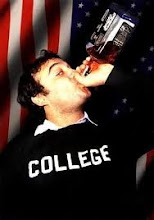
I didn't do it. I don't intend to.
At least not for now.
A few weeks ago I dropped my supposedly waterproof Sony Sports Walkman in a lake and it stopped working.
So instead of being bombarded with radio talk noise and incessant commercial pronunciementos, I actually was able to take my morning bike ride in relative silence. Heard birds chirping. Heard carp splashing in the river.
Even had a few stray thoughts that were not prompted by some fellow barking into my radio ear buds.
It reminded me that during my junior and senior years of undergrad, I never watched TV and seldom listened to the radio --and they were my most productive and thoughtful (and peaceful)years in school.
Customarily, of late I would listen to the Walkman at night -- Cubs games or Milt Rosenberg or the Savage Nation.
But while the Walkman was drying out and thoroughly afunctional, I actually read a book a night.
I read "The Guns of Navarone," written in 1957 by Alister Maclean.
I saw the movie as a very young boy, in a theatre with my father and sister. It was the top-selling movie of 1961, so we probably saw in in 1962 when it was making the rounds at the 50 cent 2nd tier theatres.
The reason I got this book from a used book exchange, was that I have discovered that the book that begot a film is usually vastly superior to the usually tawdry and overblown interpretation that Hollywood wrings from it.
That was true with this.
Alister Maclean was a no-nonsense Scotsman and he kept sex entirely out of his war novels as a matter of principle. He thought it needlessly distracted from the plot and character development. So there were no women at all in the written version of "The Guns of Navarone."
Hollywood, of course, replaced the male Greek partisan helpers with 2 hot Mediterranean babes, Irene Pappas and the very hot Gia Scala (who regrettably succumbed to drink and killed herself at age 38.)
It has been so long since I saw the film that I can't say definitively that the book was vastly better (all my pre-pubescent recollection offers is Gia Scala's beautifully sculpted and deliciously tanned body) but the book was a genuine page turner.
Another example of a book's superiority to the subsequent film is another 60s era war epic, "Von Ryan's Express." It was written by a WWII vet, David Westheimer in 1964 and became a hit movie the next year.
I had seen the film many times, but found a copy of the book at a used book store and eagerly devoured it. It was superb and far superior to the Hollywood adaptation.
For one thing, the POW camp leader, Col. Joseph Ryan, was a full-bored Irish American but was called Von Ryan by his troops, because of his strict disciplinary standards. Hollywood cast that quintessential Irishman, Frank Sinatra, in the role.
Moreover, in the book, the ending is happy as the POW escapees' train makes it safely to Switzerland.
In the film, Frank is gunned down while running and straining to catch hold of the caboose.
I don't recall if Hollywood injected sex into the film, but I have a feeling that they must have at some point.
One last example of book superiority to film is "The Firm," one of John Grisham's better earlier works. The book was hardly a masterpiece, but was gripping pulp fiction. Had I not read the book, I don't think I would have had a clue as to what Tom Cruise, Jean Tripplehorn and Gene Hackman were up to in the film version -- in and of itself, the film was veritably incomprehensible.
So, I'm going to forgo TV (what a novel idea -- how did our grandparents ever manage to survive?!) read more for a while. I'm not going to really miss "Two and a half men," and "Seinfeld" re-runs all that much.
And I may actually get a little more time for some quiet thought not prompted by mass media noise.
And if I really must find out what the erratic North Side Baseball team is up to, my Walkman has finally dried out and is functional again.














No comments:
Post a Comment
Comments invited, however anonymous commentors had better deal directly with the issues raised and avoid ad hominem drivel. As for Teachers' Union seminar writers -- forget about it.